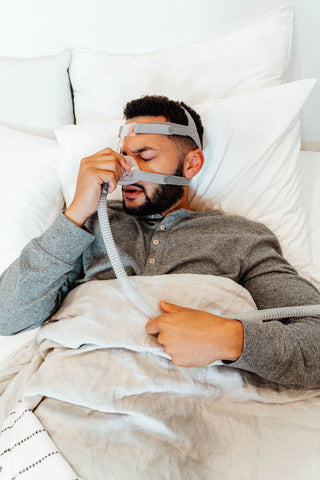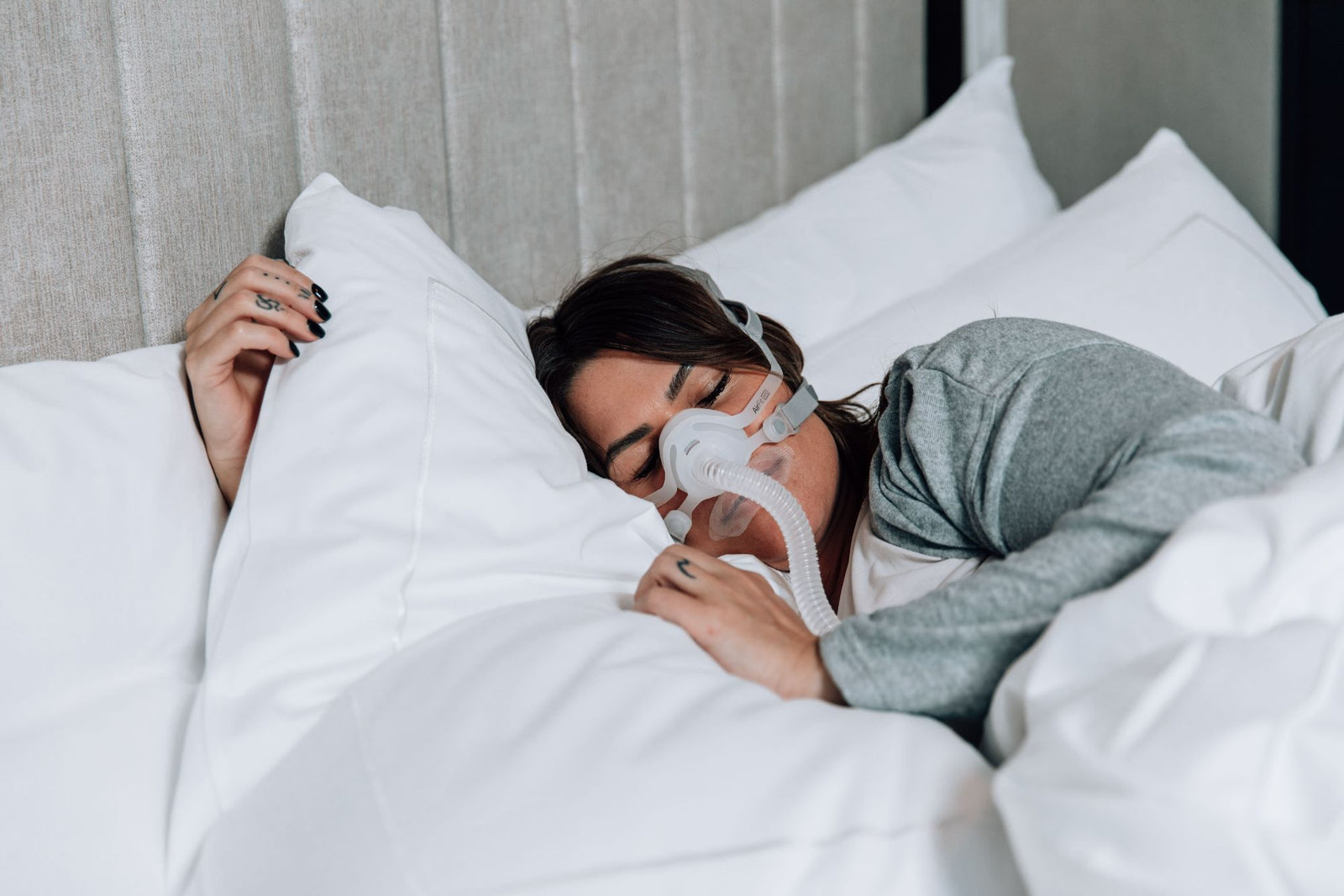If you suffer from sleep apnea, proper treatment is crucial. Without it, the risk of health problems such as hypertension, stroke, heart attacks, diabetes, and obesity rise.
That’s why you have to follow through with the treatment plan given to you by your sleep specialist or doctor. However, side effects like dry mouth can make using a CPAP machine nearly unbearable.
In fact, over half of sleep apnea patients stop using their CPAP device due to the discomfort associated with sleeping with one, like waking up with a dry mouth every morning.
However, we have some good news: you don’t need to suffer from a dry mouth as a result of your CPAP therapy. Here are some common CPAP dry mouth causes (and how to remedy each problem for good).
Cause #1: Poor Fitting Mask and Mask Leaks
Ill-fitting CPAP masks can cause mask leaks and, consequently, dry mouth. One of the quickest dry mouth remedies is to check your mask for leaks and adjust the fit accordingly.
Your mask should leaksome air, but not much. Over time, the lining and cushion of your mask can bend, stretch, and break down due to the natural oils in the skin.

This causes small holes in the lining that may be secretly leaking air.
If your mask is too loose or the liner is damaged, too much air is escaping as you breathe, drying out your mouth.
Never over-tighten your mask to prevent leaks. This may cause discomfort, pressure sores, or rash and irritation of the skin.
Instead, adjust your current mask for a proper fit or ask your doctor to try another type of mask.
Types of masks include:
- Full face masks: cover both the nose and the mouth
- Nasal masks: only cover the nose for a lighter fit
- Nasal pillow masks: cover the nostrils only, providing the most low-profile fit
Check your mask for leaks and customize the fit while laying in your normal sleeping position as opposed to sitting up. If the mask still leaks after you adjust it, you may need to replace it altogether.
Beyond mask fit, unheated, dry air is yet another common contributor to CPAP dry mouth every morning.
Cause #2: Unheated and Unhumidified Air
One of the top dry mouth causes? Delivering dry air through your CPAP machine!
Believe it or not, some CPAP machines offer heat and humidity features that prevent the mouth from drying out.
Patients who use these features are up to 43% less likely to ditch CPAP treatment when compared to those who don’t!

These devices add both moisture and heat to the air delivered through your mask.
Typically, these levels are adjustable so that you don’t end up with too much condensation within the tubes of your machine.
Cold and dry air irritate the nasal passages and worsen congestion, leading to mouth breathing. As a result, saliva evaporates and dry mouth runs rampant.
Added heat and humidity are especially important during winter months when the air is naturally dry and cold.
Furthermore, you can use humidification year-round if you live in a dry, desert-like climate or if you run your air conditioner or fan in your bedroom often.

Check your current machine to see if heat and humidity are pre-existing features. If you’re a newly diagnosed sleep apnea sufferer, request a machine with heat and humidity options.
Heat and humidity help to lubricate the lungs and prep the breath for oxygen absorption. Our bodies also have a built-in heat and humidity feature: our nose.
If you’re breathing through your mouth during sleep, dry mouth is a given.
Cause #3: Mouth Breathing at Night
Suffering from bad breath and dry mouth every morning can be tied back to mouth breathing at night.
One of the most surprising dry mouth remedies is to get used to nasal breathing instead of mouth breathing, day and night.
If you’re used to breathing through your mouth, it’s hard to make the switch to nasal breathing. Allergies and nasal congestion make it uncomfortable to exchange air through the nostrils.

However, the more you breathe through the mouth, the worse nasal congestion becomes. Moreover, the nose features filtration that the mouth does not, keeping allergens, dust, and pathogens out of the lungs and body.
Moisture and temperate control are also possible via nose breathing, while mouth breathing leaves our breath high and dry.
The nose also produces nitric oxide, a molecule that takes our stress levels down a notch, making sleep more achievable.
No matter the cause of mouth breathing, harmful and unexpected side effects can follow. Mouth breathing has been thought to cause:
- Bad breath
- Sore throat
- Gum disease
- Tooth decay
- Snoring
- Worsened sleep apnea
If you’re still breathing through your mouth during CPAP use, your doctor may suggest a chin strap. But these are known for being uncomfortable, cumbersome, and downright irritating.
(Plus, who wants to wrap their head in velcro before going to sleep?)
Mouth tape is a far less invasive, comfortable, quick alternative.
Cause #4: Using Chin Straps Instead of Mouth Tape
Out of all dry mouth causes, this one might surprise you the most.
As we’ve just learned, mouth breathing is the fastest way to dry out your mouth. Chin straps, which are commonly used to prevent an open mouth during sleep, don’t always solve the problem.
Typically, full face mask users who want to switch to a lower-profile option have to use chin straps to keep their mouths closed, which can be just as uncomfortable as a fuller face mask, if not more.
It’s no secret: chin straps suck. Mouth leaks are still possible while wearing them, making all of the discomfort a lost cause.
Our best solution of all dry mouth remedies? Mouth tape. Mouth tape checks all of the boxes chin straps shouldwithout all of the extra hassle.
@somnifix Reply to @somnifix #MouthTape prevents #snoring , #mouthbreathing , and improves #sleep 😮💨 #nasalbreathing is key! @healthcoachkait demonstrates how to tape your mouth with #somnifix ♬ original sound - 𝑉𝑎𝑛𝑒𝑠𝑠𝑎😩🤪
Plus, it helps you nasal breathe as you sleep to prevent snoring, dry mouth, and poor sleep quality. Ditch your chin strap and give mouth tape a spin!
But don’t reach for duct tape, which is extremely irritating to the skin. You need a tape that’s made specially for your sensitive skin.
SomniFix Is The Ultimate Dry Mouth Remedy
CPAP dry mouth is no joke, but stopping CPAP treatment altogether is harmful to your health.
The easiest way to make CPAP use more comfortable and prevent dreaded dry mouth every morning? Tape your mouth with SomniFix Mouth Strips.

Our strips offer a gel-like adhesive that you won’t find anywhere else. Furthermore, our strips are hypoallergenic and free from irritating chemicals and additives.
We’ve also added a breathing vent that allows for mouth breathing during emergencies, such as periods of intense congestion due to allergies or illness.
A sleep apnea diagnosis doesn’t mean you’re doomed to poor sleep forever. SomniFix means no more sleepless nights or dry mouth every morning!
Pop a strip on, put on your CPAP mask, and nasal breathe your way to your best night’s sleep yet.



